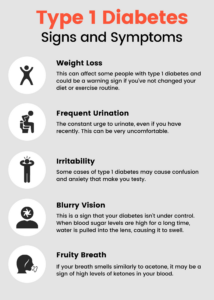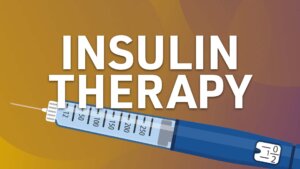Diabetes is a chronic condition that affects how your body turns food into energy. Your body breaks down the food you eat into sugar (glucose) and it gets released into your bloodstream. As your blood sugar increases, your pancreas is responsible for releasing insulin. With diabetes, the body is producing little to no insulin.

Type 1 Diabetes
Type 1 diabetes is caused by an autoimmune reaction that occurs in the body. This reaction causes the pancreas to stop making insulin.
Usually diagnosed during childhood or young adulthood. People who have type 1 diabetes have to inject themselves with insulin before eating meals. The amount of insulin they need to inject is based on how many carbohydrates they will be consuming.
It is important to check blood glucose levels to monitor when they are high and low. Insulin should be injected and adjusted based on diet and exercise. There is currently no cure for type 1 diabetes.
Insulin Therapy

Type 1 diabetics are required to inject insulin into their bodies before consuming meals. They need to inject insulin based on how many carbohydrates they will be eating. Some recommendations for insulin therapy include:
- Do not expose insulin to temperatures that are greater than 32 degrees Celsius.
- Do not transport insulin below zero degrees Celsius.
- If insulin is stored in the home for longer than two months it should be stored at 2-8 degrees Celsius.
- Insulin should never be immersed under water, it can cause contamination if the vial has been pierced.
- Intramuscular injections should be avoided due to a risk for developing hypoglycemia, if long-acting insulins are being used.
- Needles should not be used more than 5 times.
Type 2 Diabetes
Those who have type 2 diabetes have a hard time keeping their blood sugars at a normal level. Pre-diabetes and type 2 diabetes can both be caused by genetics but both can also be prevented.
With pre-diabetes, blood sugar levels are higher than usual, but they are not high enough to be diagnosed with type 2 diabetes. Having pre-diabetes puts the body at risk for developing type 2 diabetes, heart disease or having a stroke.
Some tips to prevent pre-diabetes and type 2 diabetes include eating healthy, maintaining a healthy weight and exercising.
Living with Diabetes

It is still possible to live a long, healthy life with diabetes. The key is to adjust your lifestyle. Here are a few tips:
- Attend regular appointments with your care provider
- Maintain a healthy blood glucose level, blood glucose levels can be checked by poking your fingertip and using a blood glucose meter.
- Eat a variety of foods: vegetables, fruits, nonfat dairy products, whole grains, lean meats, poultry and fish.
- Monitor carbohydrate intake.
- Engage in 30 minutes of moderate to vigorous exercise daily to help maintain a lower blood glucose level.
- Get 8-10 hours of sleep each night.
References
Bahendeka S, Kaushik R, Swai AB, Otieno F, Bajaj S, Kalra S, Bavuma CM, Karigire C. EADSG Guidelines: Insulin Storage and Optimisation of Injection Technique in Diabetes Management. Diabetes Ther. 2019 Apr;10(2):341-366. doi: 10.1007/s13300-019-0574-x. Epub 2019 Feb 27. PMID: 30815830; PMCID: PMC6437255.
Carnethon MR, De Chavez PJ, Biggs ML, Lewis CE, Pankow JS, Bertoni AG, Golden SH, Liu K, Mukamal KJ, Campbell-Jenkins B, Dyer AR. Association of weight status with mortality in adults with incident diabetes. JAMA. 2012 Aug 8;308(6):581-90. doi: 10.1001/jama.2012.9282. Erratum in: JAMA. 2012 Nov 28;308(20):2085. PMID: 22871870; PMCID: PMC3467944.
Gavin III, J. R. (2008). a healthier you learning the facts and figures about diabetes. Ebony, 63(5), 129.
Tracy, E. L., Berg, C. A., Kent de Grey, R. G., Allen, N. A., Litchman, M. L., Butner, J., & Helgeson, V. S. (2020). The benefits of daily exercise on blood glucose levels and affect among adults with type 1 diabetes. Journal of Behavioral Medicine, 43(6), 1056–1061. https://doi-org.ezproxy.neit.edu/10.1007/s10865-020-00158-x
